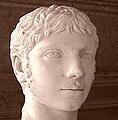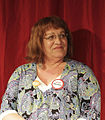Welcome to the Transgender portal Often, transgender people desire medical assistance to medically transition from one sex to another; those who do may identify as transsexual. Transgender does not have a universally accepted definition, including among researchers; it can function as an umbrella term. The definition given above includes binary trans men and trans women and may also include people who are non-binary or genderqueer. Other related groups include third-gender people, cross-dressers, and drag queens and drag kings; some definitions include these groups as well.
Many transgender people experience gender dysphoria, and some seek medical treatments such as hormone replacement therapy, gender-affirming surgery, or psychotherapy. Not all transgender people desire these treatments, and some cannot undergo them for legal, financial, or medical reasons. The legal status of transgender people varies by jurisdiction. Many transgender people experience transphobia (violence or discrimination against transgender people) in the workplace, in accessing public accommodations, and in healthcare. In many places, they are not legally protected from discrimination.[page needed] Several cultural events are held to celebrate the awareness of transgender people, including Transgender Day of Remembrance and International Transgender Day of Visibility, and the transgender flag is a common transgender pride symbol. (Full article...) Selected articleThe participation of transgender people in competitive sports, a traditionally sex-segregated institution, is a controversial issue, particularly the inclusion of transgender women and girls in women's sports. Opponents argue that transgender women have an unfair advantage over, and may endanger, cisgender women in competitive sports due to sex differences in human physiology, and that these differences are not sufficiently reversed by transgender hormone therapies. Supporters of transgender athletes argue that medically prescribed puberty blockers and estrogen suppress testosterone levels and reduce the muscle mass of transgender women, reducing possible competitive advantages. Supporters also argue that sport, particularly youth sports, is also about belonging, well-being, and socialization of young people. The American Medical Association states that legislation barring trans women from women's sports harms the mental health of transgender people. The controversy has caused debates regarding sex verification in sports. Since the mid-twentieth century, sports institutions have responded to the participation of transgender women and women suspected to be transgender, male, or intersex by adding eligibility requirements to women's sports variously determined by physical examination, sex chromosomes, and sex hormones. Proponents of such regulations regard them as necessary to ensure fair competition and women's safety. Opponents have criticized such regulations as unfounded, degrading, misogynistic, discriminatory against transgender and intersex women, disproportionately affecting women of color, and violating medical ethics and human rights.[excessive citations] Selected biography Georgina Beyer (b 1957) was the world's first openly transsexual Member of Parliament, and from 27 November 1999 until 14 February 2007 was an MP for the Labour Party in New Zealand. Born George Bertrand in 1957 in Wellington, Māori of Te Āti Awa, Ngāti Mutunga, Ngāti Raukawa, and Ngāti Porou descent, Beyer spent her early childhood on her grandparents' farm in Taranaki. Later she shifted to Wellington to live with her mother, who had subsequently married Colin Beyer, a prominent lawyer and businessman. Shortly after leaving school at Wellington's Onslow College, Beyer discovered Wellington's gay scene, and at the age of 17 realised she was transgender. Did you know (auto-generated) -
This month's birthdays
More did you know...
Random quoteI may have a beard, and manly limbs and body, yet confined by these, I am and remain a woman. Related portalsSelected picturesTopics
CategoriesWikiProjects WikiProjects are non-hierarchical peer-run groups which serve as a resource for the communication on, and collaboration of, content within a specific topic area. Related WikiProjects: Things you can do
Associated WikimediaThe following Wikimedia Foundation sister projects provide more on this subject:
|
Discover Wikipedia using portals




























